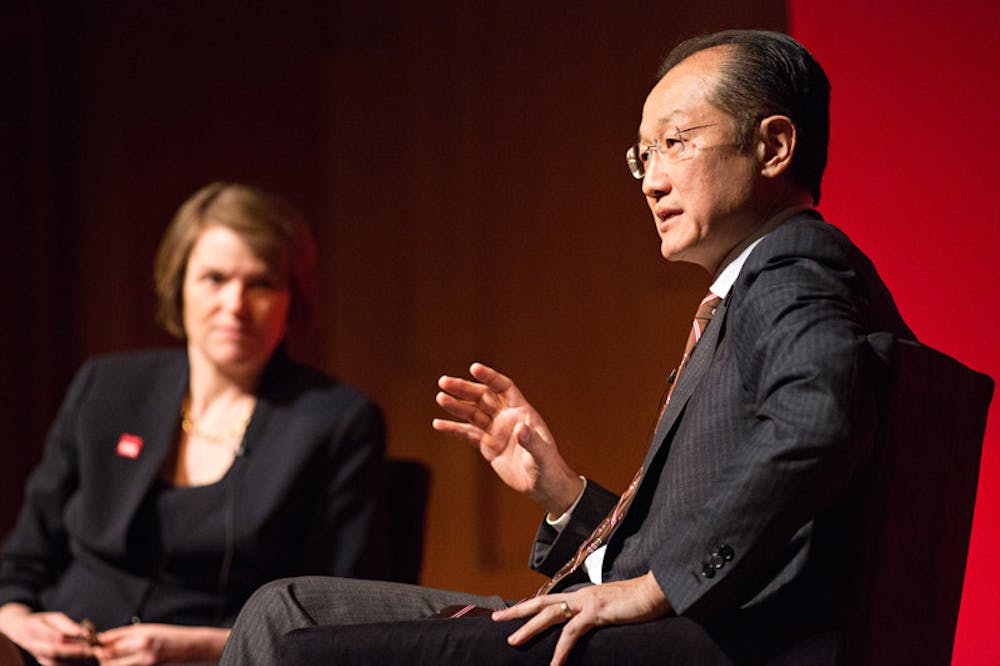“If you are here today, and if you graduate from Brown, you are ready to tackle just about anything — don’t be fearful,” said World Bank Group President Jim Yong Kim ’82 in a lecture delivered Friday afternoon to a packed Salomon 101.
Kim’s talk, part of the Stephen A. Ogden ’60 Memorial Lecture series, helped kick off the University’s opening celebration of its 250th anniversary this weekend.
Kim, who served as Dartmouth’s president from 2009 to 2012, addressed a wide range of current issues, including development in poorer regions and climate change. The question of “what is to be done in the world, and what will I do to change it?” has motivated Kim throughout his life, he said, adding that students should figure out their own answers to this question.
As World Bank president, Kim and his colleagues aim to boost prosperity and end extreme poverty within a generation, he said. During a conversation with Pope Francis, the pope expressed support for the World Bank’s vision for stimulating growth in poorer regions, Kim added.
Praising his team of World Bank staffers for spending time outside of office cubicles “building bridges and health care systems,” Kim said he hopes to achieve the organization’s goals through a variety of strategies, including increasing women’s participation in the global workforce and improving health care and education worldwide.
But the rising tide of climate change threatening people in extreme poverty, who are often disproportionately affected by environmental damage, impedes poverty reduction and economic development efforts, he noted.
“It’s fundamentally unjust that those least responsible for raising the Earth’s temperature will suffer the greatest consequences,” Kim said. He added that he encourages global leaders “to cut carbon emissions in cities, promote climate-smart agriculture, increase investment in renewable energy, set a predictable price for carbon and end fossil fuel subsidies.”
Kim has been involved in political activism throughout his life. While he was at Brown, Kim and some of his friends from the Third World Center wore black during Family Weekend to protest the University’s decision to raise tuition without increasing financial aid, he said. Advocacy efforts for greater financial aid eventually helped lead the University to adopt a need-blind admission policy, he added.
Kim said he was even involved in demonstrations against the World Bank a couple decades ago, protesting the bank’s approach to stimulating growth in developing countries. This story drew laughter from the audience, as Kim displayed a sense of humor about his activist past.
When Kim’s father picked him up at the airport after his first semester at Brown, inquiring about his area of study, he pulled the car over and killed the engine when Kim announced, “I want to study philosophy and political science,” Kim said.
His father, a dentist, replied, “You know, Jim, after you finish your medical residency, you can do anything you want,” Kim said.
In response to the crowd’s laughter, Kim deadpanned, “I have actually told this story to an Asian audience and nobody laughed.”
When discussing his choice of attending medical school, Kim told the audience that he initially wanted to attend the University of California, San Francisco, located in an area with a significant Asian-American population. “I was going to be down with my people,” he said, eliciting laughter from audience members. He ultimately attended Harvard Medical School.
Kim’s stories of friendship, procrastination and stress in an introductory organic chemistry course served to remind students and alums that he, too, had been a student on College Hill in the not-too-distant past.
Kim also addressed the campus debate over whether the University should divest the endowment from coal companies. Though Kim said he would not take a position on whether he supported the Corporation’s October decision not to divest endowment assets, he expressed admiration for student activists who advocated for the issue to be addressed.
“I’m so proud, as an alumnus, that students raised these difficult questions,” Kim said.
During the following question-and-answer session, Kim and attendees discussed controversial issues, including climate change, water privatization and the political crisis in Ukraine.
One student pressed Kim on his position on coal divestment, even attempting to give the World Bank president a Brown Divest Coal t-shirt. In response, Kim stressed the World Bank’s “nuanced position on coal” and said Brown faculty members and students make a great contribution to fighting climate change.
Kim engaged with one student who identified himself as an entrepreneur looking for advice on how to be successful. Technical excellence, trustworthiness and the possession of “fire in the belly” are key qualities that help lead to future success, Kim said, offering one of his business cards to the student.
Though much of the lecture’s subject matter was serious, Kim’s warm personality gave the talk “a kick,” said Mili Sanwalka ’17.
Kim encouraged students to act on their desire to make a difference.
“I want you to remember how you feel at this very moment in your life — passionate, driven, wanting to change the world,” Kim said. “When Dr. King talked about bending the arc of history, he didn’t mean that we should be spectators who stand by and watch history unfold. He showed us through his own life that all of us must do our part to grab the arc of history and bend it toward justice with everything we have.”

ADVERTISEMENT




